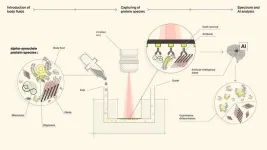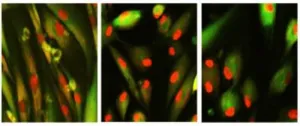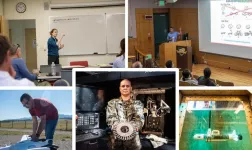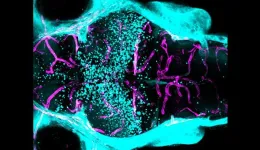(Press-News.org) AUKLAND, NZ and DURHAM, N.C. – Companion robots enhanced with artificial intelligence may one day help alleviate the loneliness epidemic, suggests a new report from researchers at Auckland, Duke, and Cornell Universities.
Their report, appearing in the July 12 issue of Science Robotics, maps some of the ethical considerations for governments, policy makers, technologists, and clinicians, and urges stakeholders to come together to rapidly develop guidelines for trust, agency, engagement, and real-world efficacy.
It also proposes a new way to measure whether a companion robot is helping someone.
“Right now, all the evidence points to having a real friend as the best solution,” said Murali Doraiswamy, MBBS, FRCP, professor of Psychiatry and Geriatrics at Duke University and member of the Duke Institute for Brain Sciences. “But until society prioritizes social connectedness and eldercare, robots are a solution for the millions of isolated people who have no other solutions.”
The number of Americans with no close friends has quadrupled since 1990, according to the Survey Center on American Life. Increased loneliness and social isolation may affect a third of the world population, and come with serious health consequences, such as increased risk for mental illness, obesity, dementia, and early death. Loneliness may even be as pernicious a health factor as smoking cigarettes, according to the U.S. Surgeon General Vivek H. Murthy, M.D.
While it is increasingly difficult to make new friends as an adult to help offset loneliness, making a companion robot to support socially isolated older adults may prove to be a promising solution.
“AI presents exciting opportunities to give companion robots greater skills to build social connection,” said Elizabeth Broadbent, Ph.D., professor of Psychological Medicine at Waipapa Taumata Rau, University of Auckland. “But we need to be careful to build in rules to ensure they are moral and trustworthy.”
Social robots like the ElliQ have had thousands of interactions with human users, nearly half related to simple companionship, including company over a cup of tea or coffee. A growing body of research on companion robots suggests they can reduce stress and loneliness and can help older people remain healthy and active in their homes.
Newer robots embedded with advanced AI programs may foster stronger social connections with humans than earlier generations of robots. Generative AI like ChatGPT, which is based on large language models, allows robots to engage in more spontaneous conversations, and even mimic the voices of old friends and loved ones who have passed away.
Doctors are mostly on board, too, the authors point out. A Sermo survey of 307 care providers across Europe and the United States showed that 69% of physicians agreed that social robots could provide companionship, relieve isolation, and potentially improve patients’ mental health. Seventy percent of doctors also felt insurance companies should cover the cost of companion robots if they prove to be effective friendship supplement. How to measure a robot’s impact, though, remains tricky.
This lack of measurability highlights the need to develop patient-rated outcome measures, such as the one being developed by the authors. The “Companion Robot Impact Scale” (Co-Bot-I-7) aims to establish the impact on physical health and loneliness, and is showing that companion machines might already be proving effective.
Early results from Broadbent’s lab, for example, find that amiable androids help reduce stress and even promote skin healing after a minor wound.
“With the right ethical guidelines,” the authors conclude in their report, “we may be able to build on current work to use robots to create a healthier society.”
In addition to Dr. Doraiswamy and Professor Broadbent, study authors include Mark Billinghurst, Ph.D., and Samantha Boardman, M.D.
Professor Broadbent and Dr. Doraiswamy have served as advisors to Sermo and technology companies. Dr. Doraiswamy, Professor Broadbent, and Dr. Boardman are co-developers of the Co-Bot-I-7 scale.
CITATION: “Enhancing Social Connectedness With Companion Robots Employing AI,” Elizabeth Broadbent, Mark Billinghurst, Samantha G. Boardman, P. Murali Doraiswamy. Science Robotics, July 12, 2023. DOI: 10.1126/scirobotics.adi6347
END
Could AI-powered robot “companions” combat human loneliness?
Companion robots may help socially isolated people avoid the health risks of being alone
2023-07-12
ELSE PRESS RELEASES FROM THIS DATE:
Those who are smarter live longer
2023-07-12
Cognitive abilities not only vary among different species but also among individuals within the same species. It is expected that smarter individuals live longer, as they are likely to make better decisions, regarding habitat and food selection, predator avoidance, and infant care. To investigate the factors influencing life expectancy of wild gray mouse lemurs, researchers from the German Primate Center conducted a long-term study in Madagascar. They administered four different cognitive tests and two personality tests to 198 animals, while also measuring their weight and tracking their survival over several years. ...
Secrets of Egyptian painters revealed by chemistry
2023-07-12
Within the scope of a vast research program undertaken in coordination with the Egyptian Ministry of Antiquities and the University of Liège, an international team—including scientists from the CNRS, Sorbonne University, and Université Grenoble Alpes—has revealed the artistic license exercised in two ancient Egyptian funerary paintings (dating to ~1,400 and ~1,200 BCE, respectively), as evident in newly discovered details invisible to the naked eye. Their findings are published in PLOS ONE (12 July).
The language of ancient ...
A novel biosensor for detecting neurogenerative disease proteins
2023-07-12
By combining multiple advanced technologies into a single system, EPFL researchers have made a significant step forward in diagnosing neurodegenerative diseases (NDDs) such as Parkinson's disease (PD) and Alzheimer's disease (AD). This novel device is known as the ImmunoSEIRA sensor, a biosensing technology that enables the detection and identification of misfolded protein biomarkers associated with NDDs. The research, published today in Science Advances, also harnesses the power of artificial intelligence (AI) by employing neural networks to quantify disease ...
Eliminating public health scourge can also benefit agriculture
2023-07-12
Schistosomiasis, a parasitic disease that causes organ damage and death, affected more than 250 million people worldwide in 2021, according to the World Health Organization.
One of the world’s most burdensome neglected tropical diseases, schistosomiasis occurs when worms are transmitted from freshwater snails to humans. The snails thrive in water with plants and algae that proliferate in areas of agricultural runoff containing fertilizer. People become infected during routine activities in infested water.
Researchers from the University of Notre Dame, in a study recently published in Nature, found that removing invasive vegetation at water access points in and around several ...
Rosé renaissance: Spanish study uncorks ultrasound for superior wine quality
2023-07-12
Since the International Organisation of Vine and Wine (OIV) approved the use of ultrasound to promote the extraction of grape compounds back in 2019, its application for obtaining superior red wines has been studied extensively.
Now researchers are turning their attention to rosé – an expanding market which has seen strong growth over the past 15 years. A team from the University of Castilla-La Mancha and the University of Murcia in Spain used high-power ultrasound technology to treat Monastrell crushed grapes – a process known as sonication ...
NEW STUDY: Discovery of chemical means to reverse aging and restore cellular function
2023-07-12
On July 12, 2023, a new research paper was published in Aging, titled, “Chemically induced reprogramming to reverse cellular aging.”
BUFFALO, NY- July 12, 2023 – In a groundbreaking study, researchers have unlocked a new frontier in the fight against aging and age-related diseases. The study, conducted by a team of scientists at Harvard Medical School, has published the first chemical approach to reprogram cells to a younger state. Previously, this was only achievable using a powerful gene ...
Empowering student ideas: NPS introduces the Naval Innovation Exchange
2023-07-12
The Naval Innovation Center (NIC) at the Naval Postgraduate School (NPS) in Monterey, Calif., is part of the Secretary of the Navy’s initiative to leverage the power of American innovation for national security. Integral to the function of the NIC is the Naval Innovation Exchange (NIX), a new program that organizes and empowers multidisciplinary teams of NPS students and faculty focused on developing prototype research solutions.
While in its early stages, the NIC at NPS will leverage and empower ...
Researchers uncover signal needed for blood-brain barrier
2023-07-12
At a glance:
Working with mice and zebrafish, researchers identify a gene, expressed in neurons, that produces a signal needed for development and maintenance of the blood-brain barrier.
When mutated, the gene makes certain regions of the blood-brain barrier more permeable.
The findings could help scientists control the blood-brain barrier — important for delivering drugs into the central nervous system or countering damage from neurodegenerative disease
What makes the vital layer of protective cells around the brain and spinal cord — ...
Psychedelic-assisted therapies for patients with PTSD
2023-07-12
Psychedelic-based therapies are poised to change the treatments that psychiatrists can offer patients.
“I often talk about psychedelic treatments as catalysts for change, for both the individual and the field of psychiatry,” said Medical University of South Carolina psychiatrist Jennifer Jones, M.D., who conducts research on these treatments.
The highly anticipated approval of MDMA, or “ecstasy,” to treat post-traumatic stress disorder would be the first for a psychedelic drug, ushering in changes for patients, mental health providers and society. The Food and Drug Administration is expected to issue a decision on MDMA-assisted ...
Mass General Cancer Center researchers pinpoint protein tied to drug resistance in patients with lung cancer
2023-07-12
Cancer therapies that target specific genetic abnormalities in tumors have revolutionized treatment possibilities over the past two decades. While quality of life and survival are improved with targeted therapies, relapse is common due to the evolution of new tumor cells that are resistant to the targeted therapy. A new study by investigators from the Mass General Cancer Center, a member of the Mass General Brigham healthcare system, reveals how lung tumors may develop drug resistance over time, pointing to a protein, called APOBEC3A, that could be a promising target. Results, published in Nature, may help researchers develop new ...
LAST 30 PRESS RELEASES:
Novel camel antimicrobial peptides show promise against drug-resistant bacteria
Scientists discover why we know when to stop scratching an itch
A hidden reason inner ear cells die – and what it means for preventing hearing loss
Researchers discover how tuberculosis bacteria use a “stealth” mechanism to evade the immune system
New microscopy technique lets scientists see cells in unprecedented detail and color
Sometimes less is more: Scientists rethink how to pack medicine into tiny delivery capsules
Scientists build low-cost microscope to study living cells in zero gravity
The Biophysical Journal names Denis V. Titov the 2025 Paper of the Year-Early Career Investigator awardee
Scientists show how your body senses cold—and why menthol feels cool
Scientists deliver new molecule for getting DNA into cells
Study reveals insights about brain regions linked to OCD, informing potential treatments
Does ocean saltiness influence El Niño?
2026 Young Investigators: ONR celebrates new talent tackling warfighter challenges
Genetics help explain who gets the ‘telltale tingle’ from music, art and literature
Many Americans misunderstand medical aid in dying laws
Researchers publish landmark infectious disease study in ‘Science’
New NSF award supports innovative role-playing game approach to strengthening research security in academia
Kumar named to ACMA Emerging Leaders Program for 2026
AI language models could transform aquatic environmental risk assessment
New isotope tools reveal hidden pathways reshaping the global nitrogen cycle
Study reveals how antibiotic structure controls removal from water using biochar
Why chronic pain lasts longer in women: Immune cells offer clues
Toxic exposure creates epigenetic disease risk over 20 generations
More time spent on social media linked to steroid use intentions among boys and men
New study suggests a “kick it while it’s down” approach to cancer treatment could improve cure rates
Milken Institute, Ann Theodore Foundation launch new grant to support clinical trial for potential sarcoidosis treatment
New strategies boost effectiveness of CAR-NK therapy against cancer
Study: Adolescent cannabis use linked to doubling risk of psychotic and bipolar disorders
Invisible harms: drug-related deaths spike after hurricanes and tropical storms
Adolescent cannabis use and risk of psychotic, bipolar, depressive, and anxiety disorders
[Press-News.org] Could AI-powered robot “companions” combat human loneliness?Companion robots may help socially isolated people avoid the health risks of being alone







